GNM: Full Form, Course & Syllabus, Duration, Eligibility, Fees, Scholarships, Entrance Exam & Career Scope
January 18, 2025 2025-03-18 7:29GNM: Full Form, Course & Syllabus, Duration, Eligibility, Fees, Scholarships, Entrance Exam & Career Scope
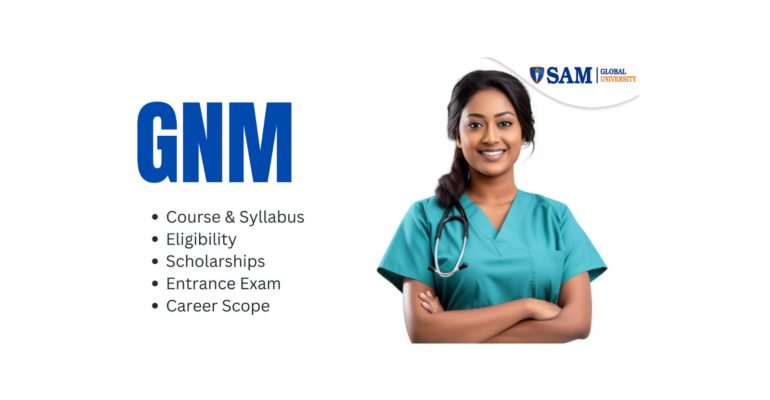
GNM: Full Form, Course & Syllabus, Duration, Eligibility, Fees, Scholarships, Entrance Exam & Career Scope
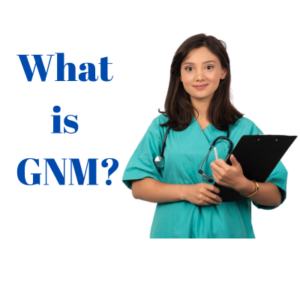 What is GNM Full Form ?
What is GNM Full Form ?
GNM stands for General Nursing and Midwifery. It is a diploma-level course in the field of nursing that focuses on training students to care for individuals, families, and communities to maintain or recover optimal health. The course is designed to equip students with both theoretical knowledge and practical skills required for patient care and midwifery services.
This program is ideal for students who wish to pursue a career in healthcare and nursing but prefer a diploma course over a degree program like B.Sc Nursing. GNM graduates play a crucial role in hospitals, clinics, and other healthcare settings, ensuring the delivery of quality medical care.
Course and Syllabus of GNM (General Nursing and Midwifery)
The GNM course is structured to provide students with theoretical knowledge and practical skills required for nursing and midwifery. The program spans 3 years, followed by a 6-month internship, and covers subjects related to healthcare, patient management, and midwifery.
Year-wise Breakdown of GNM Syllabus
First Year:
Focuses on foundational concepts in nursing and basic medical sciences.
- Anatomy and Physiology
- Structure and functions of the human body
- Basics of human systems (cardiovascular, digestive, respiratory, etc.)
- Microbiology
- Introduction to microorganisms and their role in health and disease
- Infection control and sterilization methods
- Fundamentals of Nursing
- Basics of nursing care
- Nursing procedures and patient safety
- Psychology
- Basic psychological principles and their relevance to nursing
- Understanding patient behavior
- Sociology
- Social structures and their impact on health
- Cultural aspects of healthcare
- First Aid
- Emergency procedures and basic first aid techniques
Second Year: 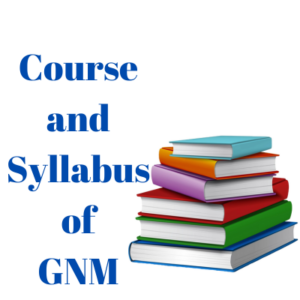
Focuses on specialized nursing areas and community health.
- Medical-Surgical Nursing I
- Care of patients with medical and surgical conditions
- Preoperative and postoperative care
- Pharmacology
- Drugs and their administration
- Drug interactions and side effects
- Community Health Nursing I
- Public health principles
- Immunization and health education
- Orthopedic Nursing
- Care of patients with bone injuries and disorders
- Communicable Diseases
- Prevention and management of infectious diseases
Third Year:
Advanced nursing and midwifery skills.
- Medical-Surgical Nursing II
- Advanced medical and surgical nursing care
- Special focus on critical care and emergencies
- Mental Health Nursing
- Caring for patients with mental health disorders
- Counseling and therapeutic communication
- Pediatric Nursing
- Health and development of children
- Managing childhood illnesses
- Midwifery and Gynecology Nursing
- Antenatal, intranatal, and postnatal care
- Assisting with childbirth and managing complications
- Community Health Nursing II
- Rural and urban health services
- Role of a nurse in community healthcare programs
Internship (6 Months)
- Hands-on training in hospitals, clinics, and healthcare facilities.
- Rotations in different departments:
- Pediatrics
- Maternity wards
- Intensive care units
- Community health programs
This structured curriculum ensures that GNM graduates are well-prepared to deliver efficient nursing care and address the healthcare needs of patients in various settings.
Duration of GNM (General Nursing and Midwifery)
The GNM course has a total duration of 3.5 years, which includes:
- 3 Years of Academic Learning:
- Divided into theoretical classes, practical training, and laboratory work.
- Covers core nursing subjects like anatomy, physiology, medical-surgical nursing, midwifery, and community health nursing.
- 6-Month Internship:
- Hands-on training in hospitals, clinics, and community health centers.
- During this period, students work under the supervision of experienced medical professionals in different healthcare departments like pediatrics, maternity, surgical wards, and emergency care.
Breakdown of the Program
- First Year: Basic sciences, fundamentals of nursing, and an introduction to healthcare.
- Second Year: Specialized nursing subjects and community health.
- Third Year: Advanced nursing, midwifery, and preparation for real-world applications.
- Internship (6 Months): Practical exposure in clinical settings to apply theoretical knowledge.
This duration ensures that students are equipped with both theoretical understanding and practical experience, making them ready for professional nursing roles.
Eligibility Criteria for GNM (General Nursing and Midwifery)
To pursue the GNM course, candidates must meet the following eligibility requirements:
Educational Qualifications 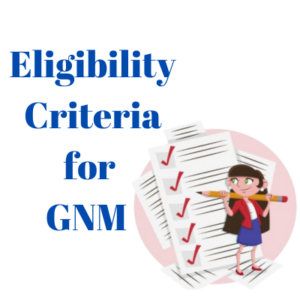
- The candidate must have completed 10+2 or equivalent from a recognized board.
- Preferred Subjects:
- Science stream with Physics, Chemistry, and Biology is highly preferred.
- However, candidates from Arts and Commerce streams are also eligible in some states and institutions.
Minimum Marks Required
- General category: 40-50% aggregate marks in 10+2.
- Reserved categories (SC/ST/OBC): Relaxation of 5%, requiring 35-45% aggregate marks.
Age Criteria
- Minimum Age: 17 years (as of 31st December of the admission year).
- Maximum Age: 35 years (age limit may vary slightly depending on the institution).
Medical Fitness
- The candidate must be medically fit and may need to provide a fitness certificate from a registered medical practitioner.
Additional Requirements
- Some institutions may conduct an entrance test or require an interview as part of the admission process.
- English proficiency might also be considered.
These eligibility criteria ensure that candidates have the required academic background, age, and physical fitness to pursue this intensive and hands-on nursing program
Fees for GNM (General Nursing and Midwifery)
The fees for the GNM course can vary based on the type of institution (government or private) and the facilities offered. Below is a general breakdown:
1. Government Colleges
- Fee Range: ₹10,000 – ₹50,000 per year
- Government institutions typically have lower fees due to subsidies provided by the state or central government.
2. Private Colleges
- Fee Range: ₹50,000 – ₹2,00,000 per year
- Private colleges charge higher fees due to better infrastructure, advanced facilities, and additional training programs.
3. Additional Costs
Apart from tuition fees, students may incur other expenses such as:
- Examination Fees: ₹2,000 – ₹10,000 per year
- Hostel and Accommodation: ₹20,000 – ₹50,000 per year (varies by location)
- Books and Study Materials: ₹5,000 – ₹15,000
- Uniforms and Lab Fees: ₹3,000 – ₹10,000
- Internship Expenses: Some institutions may charge fees for the internship period (₹5,000 – ₹15,000).
Scholarships and Financial Aid
- Many government institutions offer scholarships for students belonging to economically weaker sections (EWS), SC/ST, or OBC categories.
- Private institutions may also provide merit-based scholarships or fee waivers.
Key Note
Before enrolling, students should check with the respective institution for detailed fee structures, payment options, and any hidden charges.
Scholarships
In Madhya Pradesh, students pursuing the General Nursing and Midwifery (GNM) course can avail themselves of various scholarships offered by the state government to support their education. Below are some prominent scholarship schemes applicable to GNM students:
1. Mukhyamantri Medhavi Vidyarthi Yojana (MMVY), Madhya Pradesh 
Eligibility Criteria:
- Students who have passed their Class 12th with 75% or above marks from the Madhya Pradesh Secondary Education Board or 85% or above marks from CBSE/ICSE boards.
- The annual family income should not exceed INR 6 Lakh.
- Enrollment in an undergraduate-level course at a recognized institution.
Benefits:
- Up to 100% tuition fee waiver.
2. Post Matric Scholarship Scheme for SC/ST/OBC Students, Madhya Pradesh
Eligibility Criteria:
- Belonging to Scheduled Caste (SC), Scheduled Tribe (ST), or Other Backward Classes (OBC).
- Studying at the post-secondary level, including diploma courses like GNM.
- For SC/ST students, the annual family income should be less than INR 2,50,000 for a 100% scholarship; between INR 2,50,000 and INR 6,00,000 for a 50% scholarship.
- For OBC students, the annual family income should be less than INR 75,000 for a 100% scholarship; up to INR 1,00,000 for a 50% scholarship.
Benefits:
- Up to 100% tuition fee coverage.
3. Mukhya Mantri Jan Kalyan Yojana (MMJKY), Madhya Pradesh
Eligibility Criteria:
- Wards of individuals recognized as unorganized workers by the Labour Department of Madhya Pradesh.
- Admission to undergraduate, postgraduate, polytechnic, diploma, or ITI programs.
Benefits:
- Up to 100% tuition fee waiver.
4. Gaon Ki Beti Yojna
Eligibility Criteria:
- Female students from rural areas who have passed Class 12 with first division.
Benefits:
- Financial assistance to encourage higher education among rural girls.
Higher Education Madhya Pradesh
Application Process
- Eligible students can apply for these scholarships through the MP State Scholarship Portal.
- Ensure timely submission of applications along with the required documents to avoid any discrepancies.
These scholarships aim to make nursing education more accessible and affordable for students in Madhya Pradesh, thereby promoting a skilled healthcare workforce in the state.
Entrance Exam for GNM (General Nursing and Midwifery)
In most cases, GNM (General Nursing and Midwifery) admissions are based on an entrance exam conducted by either state-level authorities, universities, or individual nursing colleges. These entrance exams are designed to assess the eligibility of candidates based on their knowledge of subjects related to biology, chemistry, physics, and general knowledge.
Common Entrance Exams for GNM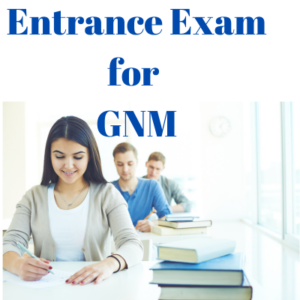
- State Nursing Entrance Exams
Many states in India conduct their own nursing entrance exams for GNM admissions. Some examples include:
- MP Nursing Entrance Exam (Madhya Pradesh)
- UP Nursing Entrance Exam (Uttar Pradesh)
- Delhi CET (Common Entrance Test) for Nursing in Delhi
- Maharashtra Nursing Entrance Exam
These exams typically test candidates on subjects like:
- Physics
- Chemistry
- Biology
- General Knowledge
- English
- University-Specific Entrance Exams
Some nursing colleges or universities may conduct their own entrance exams for admission into the GNM course. For example:
- All India Nursing Entrance Examination (AINET) (for certain private colleges)
- Nursing Entrance Exam by Banaras Hindu University (BHU)
- Merit-Based Admission
In some cases, especially in government nursing schools, GNM admissions may be based on merit from the candidate’s 12th board exam marks (particularly in states like Tamil Nadu, Karnataka, and others). However, an entrance exam is typically preferred.
Exam Pattern for GNM Entrance
The entrance exams generally follow a similar pattern, which may include the following sections:
- General Knowledge
- Questions related to current affairs, history, geography, and general awareness.
- Physics
- Basic concepts of physics related to medical science, laws of motion, light, heat, etc.
- Chemistry
- Questions on chemical reactions, acids, bases, organic and inorganic chemistry, etc.
- Biology
- Topics related to human anatomy, biology of plants and animals, cell structure, genetics, and more.
- English Language
- Questions based on comprehension, grammar, vocabulary, etc.
Application Process for Entrance Exams
- Step 1: Visit the official website of the exam conducting authority (e.g., state board or university).
- Step 2: Register and fill out the online application form.
- Step 3: Pay the application fee (if required).
- Step 4: Download the admit card for the exam.
- Step 5: Appear for the exam on the scheduled date.
Important Points
- Some institutions may also have an interview or counseling round after the entrance exam to assess the suitability of candidates.
- Admit cards and exam dates will be available on the official websites of the respective authorities.
- Students should always check the official exam notification for updated details and specific requirements.
Career Scope of GNM (General Nursing and Midwifery)
The GNM (General Nursing and Midwifery) course opens up a wide array of career opportunities in healthcare and nursing. Once you complete the GNM diploma, you can work in various medical and healthcare settings, providing essential care to patients. Here’s an overview of the career scope and potential job roles for GNM graduates:
1. Job Opportunities in Healthcare
1.1. Staff Nurse
- Job Role: As a Staff Nurse, GNM graduates provide primary healthcare and support to patients in hospitals, clinics, and nursing homes.
- Work Setting: Hospitals, nursing homes, private clinics, and healthcare facilities.
1.2. Midwife
- Job Role: A GNM graduate can work as a midwife, assisting in childbirth, providing antenatal and postnatal care, and offering guidance to expectant mothers.
- Work Setting: Maternity hospitals, clinics, public health centers, and private practices.
1.3. Community Health Nurse
- Job Role: Community health nurses work in rural or urban health centers, promoting wellness and providing primary healthcare services to underserved populations.
- Work Setting: Government health programs, NGOs, rural hospitals, and community clinics.
1.4. Pediatric Nurse
- Job Role: Pediatric nurses specialize in caring for children, managing pediatric diseases, vaccinations, and child health education.
- Work Setting: Pediatric departments in hospitals, clinics, and childcare centers.
1.5. Medical-Surgical Nurse
- Job Role: Medical-Surgical Nurses handle patients who are undergoing surgery or treatment for acute and chronic medical conditions. They monitor recovery, assist with medication, and provide post-surgery care.
- Work Setting: Hospitals, surgical centers, and rehabilitation clinics.
2. Career in Government Jobs
- Government Hospitals and Clinics: Many GNM graduates secure stable jobs in government-run hospitals, district health services, or as public health nurses in various state and national health programs.
- State/Union Public Service Commission (UPSC): You may have opportunities to apply for nursing positions in government organizations through competitive exams.
3. Higher Education Opportunities
While GNM opens doors to direct employment, further education can expand career prospects and offer specialization in various fields.
3.1. Post Basic B.Sc Nursing
- After completing GNM, you can pursue a Post Basic B.Sc Nursing to enhance your qualifications and expand your career opportunities.
3.2. M.Sc Nursing
- You can opt for an M.Sc in Nursing to specialize in various branches like pediatric nursing, community health nursing, or critical care nursing.
3.3. Nursing Management
- Course: Pursue courses in nursing management or healthcare administration to take on managerial or leadership roles in healthcare facilities.
4. Private Sector Jobs
Apart from government jobs, the private sector also offers a wide range of opportunities for GNM graduates:
4.1. Private Hospitals and Nursing Homes
- Work as a nurse in private hospitals, which often offer better pay and opportunities for career growth.
4.2. Healthcare and Medical Insurance Companies
- As a nurse, you could also work for health insurance companies, assisting with patient claims, assessments, or providing healthcare consultancy.
4.3. Clinical Research and Trials
- GNM graduates can also work in clinical research and pharmaceutical companies where patient care and data management are involved.
5. Job Roles in NGOs and International Organizations
- NGOs: Many organizations hire GNM nurses for health programs, especially those working in maternal and child health, community health awareness, and emergency response.
- International Opportunities: With the right certifications, GNM graduates may also find employment opportunities abroad, especially in countries like the US, UK, Canada, and the Middle East.
6. Career Growth and Salary Prospects
- Initial Salary: A fresh GNM graduate can earn an average salary of ₹15,000 to ₹30,000 per month, depending on the hospital, location, and role.
- With Experience: As you gain experience and expertise, you can earn anywhere between ₹30,000 to ₹50,000 per month or more in specialized roles.
- With Further Studies: Higher qualifications and specialization can lead to senior positions, such as nurse supervisor, nurse educator, or nursing administrator, with higher pay and leadership roles.
A GNM diploma provides a solid foundation for a successful career in healthcare. Whether you choose to work in hospitals, clinics, community health services, or pursue further education, GNM offers numerous avenues for career development and growth.
Why Choose SAM Global University for GNM?
SAM Global University (SGU) is an emerging and reputed educational institution that offers a variety of courses, including General Nursing and Midwifery (GNM). Here are several reasons why students may consider SAM Global University for pursuing their GNM course:
1. Recognized and Accredited Institution
- Accreditation: SAM Global University is recognized by regulatory bodies like the Indian Nursing Council (INC) and the State Nursing Council, ensuring the quality and credibility of the GNM course.
- University Status: SGU is a private university established under the MP Private Universities Act, ensuring a well-structured and formal academic environment.
2. Experienced Faculty
- The GNM program at SAM Global University is taught by experienced and qualified faculty members who have expertise in nursing, midwifery, and healthcare.
- The faculty members guide students not only academically but also provide mentorship in clinical settings, ensuring practical exposure.
3. State-of-the-Art Infrastructure
- Modern Classrooms and Laboratories: SAM Global University is equipped with well-established nursing labs, anatomy labs, and computer labs, offering students hands-on experience with medical equipment.
- Well-Equipped Nursing and Healthcare Facilities: The university provides clinical practice in its affiliated hospitals and healthcare centers, giving students real-world exposure to patient care.
4. Clinical Exposure
- Internships: SAM Global University has strong connections with leading hospitals and healthcare organizations, offering students valuable internship opportunities for hands-on learning and practical experience.
- Partnerships with Hospitals: Clinical rotations at top healthcare facilities prepare students for the realities of nursing practice and midwifery.
5. Placement Assistance 
- Job Placements: SAM Global University has a dedicated placement cell that helps GNM students secure jobs in government hospitals, private hospitals, health clinics, NGOs, and international healthcare facilities.
- The university’s strong alumni network ensures students can easily transition into professional roles upon graduation.
6. Scholarships and Financial Aid
- SAM Global University offers scholarships and financial assistance programs to support students who demonstrate financial need or exceptional academic performance.
- The scholarship programs make education affordable, especially for meritorious students.
7. Holistic Development
- Co-Curricular Activities: In addition to academics, the university offers various extra-curricular activities like sports, cultural events, and leadership programs, promoting overall personality development.
- Nursing Seminars and Workshops: SGU regularly hosts workshops, seminars, and guest lectures from industry experts, enhancing students’ knowledge and skills in modern nursing practices.
8. Excellent Campus Life
- The university provides a vibrant campus life with modern facilities like hostels, libraries, cafeterias, and sports complexes.
- Students can enjoy a balanced lifestyle, focusing on both studies and leisure activities.
9. Affordable Fees
- Cost-effective Education: SGU offers quality education at an affordable fee structure, ensuring that students from different economic backgrounds have access to top-notch nursing education.
- The university also provides flexibility in payment and fee installment options.
10. Focus on International Exposure
- For students interested in working abroad, SAM Global University equips students with the necessary skills and knowledge to clear international licensing exams (such as NCLEX for the USA, IELTS/OET for English-speaking countries, etc.).
- International Placement Assistance: The university assists students in finding nursing jobs in countries like the USA, Canada, UK, and Middle Eastern countries.
Conclusion
SAM Global University stands out as a great choice for pursuing the GNM course due to its combination of accredited programs, modern infrastructure, clinical exposure, and a focus on student success. The university’s commitment to holistic education ensures that students graduate as skilled and competent nursing professionals ready to meet the demands of the healthcare industry.
FAQs for GNM (General Nursing and Midwifery)
Here are some commonly asked questions about the GNM course:
1. What is GNM?
Answer: GNM stands for General Nursing and Midwifery. It is a 3-year diploma course that trains students to become skilled nurses capable of providing nursing care to patients and assisting in childbirth.
2. What is the eligibility for GNM?
Answer:
- You must have completed 10+2 in the Science stream with subjects like Biology, Physics, and Chemistry (preferred but not mandatory).
- The minimum required aggregate score is usually 40-50% in Class 12.
- You should be between 17 to 35 years of age.
3. What is the duration of the GNM course?
Answer: The GNM course is of 3 years duration, followed by a 6-month internship period where students gain practical experience in hospitals and clinics.
4. Is there an entrance exam for GNM?
Answer: Yes, many states and nursing schools conduct entrance exams for admission into GNM courses. These exams typically test your knowledge of biology, chemistry, physics, and general knowledge. However, some institutions may admit students based on merit or Class 12 marks.
5. What subjects are taught in the GNM course?
Answer:
- First Year: Anatomy and Physiology, Microbiology, Psychology, Sociology, Fundamentals of Nursing, First Aid.
- Second Year: Medical-Surgical Nursing, Pharmacology, Orthopedic Nursing, Communicable Diseases, Community Health Nursing I.
- Third Year: Pediatric Nursing, Mental Health Nursing, Midwifery, Medical-Surgical Nursing II, Community Health Nursing II.
6. Can I pursue further studies after completing GNM?
Answer: Yes, after completing GNM, you can pursue higher studies like:
- Post Basic B.Sc Nursing
- M.Sc Nursing
- Nursing Administration or Management
These courses help you specialize and increase your career prospects.
7. What are the career opportunities after completing GNM?
Answer: Some career options after completing GNM include:
- Staff Nurse
- Midwife
- Pediatric Nurse
- Community Health Nurse
- Medical-Surgical Nurse
- Nursing Educator
- Healthcare Administration
You can work in hospitals, clinics, community centers, NGOs, and international healthcare organizations.
8. What is the salary after completing GNM?
Answer:
- Starting Salary: ₹15,000 to ₹30,000 per month (varies by location, institution, and experience).
- With Experience: ₹30,000 to ₹50,000 per month or more, especially in specialized roles or private hospitals.
9. Are there scholarships available for GNM students?
Answer: Yes, there are various government and private scholarships available for GNM students, especially for those from economically weaker backgrounds, SC/ST, and OBC categories. Some examples include the Mukhyamantri Medhavi Vidyarthi Yojana (Madhya Pradesh) and Post Matric Scholarships for SC/ST/OBC students.
10. Is GNM a good career option?
Answer: Yes, GNM is a highly respected profession with a wide range of career opportunities in healthcare. With the increasing demand for healthcare professionals, particularly nurses, the scope for growth and job security in this field is excellent.
11. Can I work abroad after completing GNM?
Answer: Yes, GNM graduates can find job opportunities abroad, especially in countries like the US, UK, Canada, Australia, and the Middle East. However, you may need to pass the IELTS, OET, or other language proficiency tests and fulfill licensing requirements for different countries.
12. What is the difference between GNM and B.Sc Nursing?
Answer:
- GNM is a diploma course that is focused on clinical practice and patient care.
- B.Sc Nursing is a degree course that covers a broader range of nursing sciences and prepares students for more advanced roles in healthcare, including nursing administration and teaching.
13. How do I apply for the GNM course?
Answer:
- First, check the eligibility criteria and admission process for the specific college or institution you wish to apply to.
- Fill out the online or offline application form, provide the necessary documents, and appear for the entrance exam (if applicable).
- After clearing the exam or meeting merit requirements, you will be offered admission.
Video : Best Nursing Course After 12th Class
Get Free Career Counselling

Related Posts
What To Do After 12th Here Is A Quick Guide
Top High Salary Courses After 12th Science 🚀💰
Search
Categories
Popular Tags








